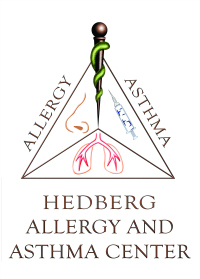 Spring is coming (in only 11 days) and I’m dreading it because of allergies! What factors do physicians use to determine when it’s time for a child or adult to get allergy shots versus managing the condition with oral medications? How quickly do people see improvement once they begin allergy shots?
Spring is coming (in only 11 days) and I’m dreading it because of allergies! What factors do physicians use to determine when it’s time for a child or adult to get allergy shots versus managing the condition with oral medications? How quickly do people see improvement once they begin allergy shots?
Response by Curtis L Hedberg, MD, FACP, FACAAI, FAAAAI – Board Certified Allergist
Spring brings a large variety of allergens that can cause allergic symptoms. Thunderstorms bring wind and rain that help the spread of pollen and mold spores. Anemophilous plants, those who disperse pollen by air currents, usually have very small pollen grains and can be carried for long distances. This type of pollen is easily inhaled into the nasal passages, into the lungs and can enter the eyes.
Entomophilous plants tend to have much larger pollen grains requiring animals, birds and insects to carry the pollen from one plant to another. Entomophilous plants usually do not cause allergy symptoms since the pollen is too large to enter the airway and cause allergy symptoms. (This helps explain why local honey doesn’t cure allergies, a common myth.)
Physicians usually encourage patients to use medications, often starting just before the spring season, and continue that treatment through the season to control allergy symptoms. Unfortunately medications only help to control symptoms (and sometimes they don’t do this well). Medications are not a cure for the treatment of allergy, but they do help decrease the release of inflammatory chemicals like histamine, decrease the production of mucous and occasionally reduce the congestion that is often felt with allergic inflammation.
 When medications do not allow a person to gain the level or control he or she wants, or when potentially life threatening conditions like asthma, severe swelling and itching of the eyes, uncontrolled eczema (allergic skin inflammation), or when swelling of the mouth or body parts presents with exposure of seasonal allergens, then allergy shots should be considered. Additional reasons to consider allergy shots are when medications either are not working well in the control of inflammation or if medications cause unwanted side effects.
When medications do not allow a person to gain the level or control he or she wants, or when potentially life threatening conditions like asthma, severe swelling and itching of the eyes, uncontrolled eczema (allergic skin inflammation), or when swelling of the mouth or body parts presents with exposure of seasonal allergens, then allergy shots should be considered. Additional reasons to consider allergy shots are when medications either are not working well in the control of inflammation or if medications cause unwanted side effects.
An important point to address, is that in children, allergy shots given for the treatment of allergic rhinitis (allergic nasal symptoms) can prevent development of asthma when compared to children who do not have allergic nasal disease. This has been shown to be true in repeated studies in the US and in Europe.
Allergy shots work to desensitize the patient by inducing the formation of “good antibodies” instead of “allergic antibodies.” This process has been shown to occur with the first allergy shot, but it is only when the good antibodies start to outnumber the allergy antibodies that symptoms start to improve and medications used to control symptoms lessen. Response time to allergy shots varies. Some patients see improvement within the first couple of months of treatment and others may not have improvement until nearly a year of allergy shots.
 Dr. Curtis L. Hedberg is a Board Certified Allergist and founding owner of Hedberg Allergy & Asthma Center, with locations in Rogers and Fayetteville. The clinic diagnoses and treats asthma, allergic rhinitis and other diseases of the upper and lower respiratory tract, drug and insect hypersensitivity, latex allergy, hives, allergic skin disease, recurrent infections and congenital immunologic deficiencies. Hedberg Allergy & Asthma Center was ranked No. 1 in the category of “Best Allergy Clinic” in the most recent Mom-Approved Awards, as voted by mothers in Northwest Arkansas. Click here to visit the clinic’s website or call 479-464-8887 (Rogers) or 479-301-8887 (Fayetteville) for more info.
Dr. Curtis L. Hedberg is a Board Certified Allergist and founding owner of Hedberg Allergy & Asthma Center, with locations in Rogers and Fayetteville. The clinic diagnoses and treats asthma, allergic rhinitis and other diseases of the upper and lower respiratory tract, drug and insect hypersensitivity, latex allergy, hives, allergic skin disease, recurrent infections and congenital immunologic deficiencies. Hedberg Allergy & Asthma Center was ranked No. 1 in the category of “Best Allergy Clinic” in the most recent Mom-Approved Awards, as voted by mothers in Northwest Arkansas. Click here to visit the clinic’s website or call 479-464-8887 (Rogers) or 479-301-8887 (Fayetteville) for more info.
